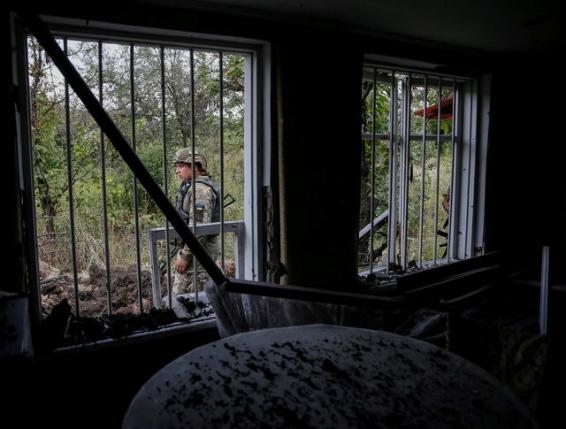Putin accuses Ukraine of trying to provoke a new conflict over Crimea
MOSCOW: Vladimir Putin accused Ukraine on Wednesday of using terrorist tactics to try to provoke a new conflict and destabilise annexed Crimea after Russia said it had thwarted two armed Ukrainian attempts to get saboteurs into the contested peninsula.
Russia's FSB security service said two people were killed in clashes and its forces had dismantled a Ukrainian spy network inside Crimea. Kiev denied the assertions, calling them an attempt by Moscow to create an excuse to escalate towards a war.
The Russian president accused Kiev of playing a dangerous game and said he saw no point in holding a new round of talks about the troubled peace process in eastern Ukraine on the sidelines of a G20 summit in China next month.
"The people who seized power in Kiev ... have switched to terror tactics instead of searching for ways for a peaceful settlement," Putin told a news conference, saying Russia would not let such actions pass without a response.
"The attempt to provoke an outbreak of violence, to provoke a conflict is nothing other than a desire to distract (Ukrainian) society from its problems," he added, calling Ukraine's actions "criminal."
Putin's comments stirred fears that Russia, which has been steadily reinforcing Crimea militarily, may be considering new military action.
Ukrainian President Petro Poroshenko said the Russian accusations were a cynical pretext to make more military threats against Ukraine.
"Russian accusations towards Ukraine of terrorism in the occupied Crimea sound as preposterous and cynical as the statements of the Russian leadership about the absence of the Russian troops in Donbass (region of Ukraine)," Poroshenko said.
The Russian allegations follow an uptick in Russian military activity in northern Crimea and heavier fighting in eastern Ukraine, where Ukrainian government troops are battling pro-Russian separatists.
If true, the events - which the FSB said involved at least two armed clashes on the border between Crimea and Ukraine - would be the most serious escalation on the contested peninsula since Moscow annexed it from Ukraine in 2014.
US and European Union sanctions to punish Russia for the land grab remain in place, though Moscow has made clear it has no intention of handing Crimea back.
Ukraine's UN Ambassador Volodymyr Yelchenko drew parallels between the current situation involving Russia and Ukraine and the lead-up to a 2008 war between Russia and Georgia.
"The scenario looks very similar and very familiar. That’s why we stand ready for any further provocative developments, the convening of the Security Council is being considered," he told reporters at the United Nations. "We still hope that it will not bring the conflict to another level, but it seems that it is quite possible unfortunately."
BORDER CLASHES
Ukraine, the United States and many western European governments say Moscow has armed and encouraged pro-Russian separatists in eastern Ukraine, and covertly infiltrated Russian military personnel.
Former US ambassador to Ukraine John Herbst said that while it was impossible to know the Kremlin’s intentions based on Putin's statements, "They’ve clearly set the stage for a crisis, and maybe a broad (military) movement."
Herbst, now at the Atlantic Council think tank, said Ukrainian security forces have strengthened their military lines in eastern Ukraine and to the north of Crimea, meaning that while Russian proxies could grab additional territory, it would not be easy.
Herbst said it was possible that "testosterone-heavy Ukrainian volunteers" had staged a provocation, as Putin charged, but added, "The odds of it being Ukrainian are 5 percent, 8 percent … Certainly, Ukrainian authorities want no part of this."
The FSB said it believed Ukrainian special forces had been planning attacks targeting critical infrastructure.
An FSB employee and a Russian soldier were killed in the clashes, it said.
"The aim of this subversive activity and terrorist acts was to destabilise the socio-political situation in the region ahead of preparations and the holding of elections," the FSB said, referring to Russia-wide parliamentary elections next month.
The FSB said it had tackled one group of Ukrainian saboteurs in an operation that spanned late Saturday and early Sunday, smashing what it called a Ukrainian spy network.
Ukraine and Russian nationals were arrested and an arms cache, including 20 homemade explosive devices, ammunition, mines, grenades and specialised weapons commonly used by Ukrainian special forces, were recovered, it said.
The FSB said the situation escalated further late on Sunday and in the early hours of Monday.
"The attempts to break through were accompanied by massive covering fire from the neighbouring state and from Ukrainian armoured vehicles," it said.
The US State Department referred questions about the Russian claims to Ukraine's government, and repeated Washington's rejection of Russia’s annexation of Crimea.
"Crimea is and will always be part of Ukraine," spokeswoman Elizabeth Trudeau told reporters
US officials are monitoring the situation, but have yet to drawn any conclusion about Russia’s intentions, said a US official, who spoke on condition of anonymity.






